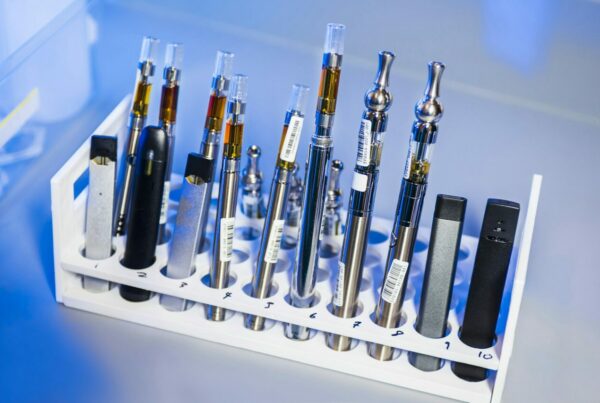N, N-Dimethyltryptamine (DMT) is a compound commonly found in both flora and fauna, known for its strong yet short-lived psychedelic effects upon ingestion.
Mounting evidence indicates that DMT, which naturally occurs in the human body, plays crucial roles in both the peripheral and central nervous systems and may act as a neurotransmitter.
DMT can trigger powerful psychedelic effects, but it generally does not cause many negative side effects, except for potential cardiovascular problems when administered in large quantities through injection.
Let’s explore DMT and its various functions, ranging from recreational use to its promising potential in scientific studies and therapeutic uses.

A Brief Outline of DMT: What is it?
| Aspect | Details |
| Name | N, N-Dimethyltryptamine (DMT) |
| Classification | Indole alkaloid |
| Occurrence | Naturally found in a variety of plants and animals |
| Psychoactive Effects | Brief, intense psychedelic experiences upon ingestion. |
| Method of Consumption | Can be smoked, injected, or consumed orally. |
| Duration of Effects | Short-lasting, usually between 5 to 30 minutes. |
| Chemical Structure | Comprises a tryptamine core with two methyl groups attached to the amine nitrogen atom. |
| Metabolism | Rapidly metabolized by the body, broken down by monoamine oxidase (MAO). |
| Cultural Use | Historically used in various ceremonial and shamanic rituals by indigenous cultures. |
| Other names | Dimitrifantasiabusinessman’s tripBusinessman’s special45-minute psychosisspiritual molecule |
The Role of DMT in Mental Health
N, N-Dimethyltryptamine (DMT), a compound famous for its potent psychedelic effects, is gaining attention for its potential benefits to mental health. Despite its conventional reputation for provoking intense visionary experiences, recent research suggests a connection between DMT and mental wellness.
Influence on Psychological and Emotional Well-being
The psychedelic effects of DMT are known to elicit profound emotional reactions and alter states of consciousness. Such effects could potentially pave the way for therapeutic methods to address mental health issues, support emotional processing, and offer new perspectives on personal traumas.
Brain Function and Neuroplasticity
Research suggests DMT may influence neuroplasticity, thereby enhancing the brain’s ability to adapt and reorganize. Investigating its impact on synaptic plasticity and neural connectivity could lead to potential treatments for conditions linked with neural dysregulation.
Potential Therapeutic Applications in Mental Health Disorders
Emerging research emphasizes the potential of DMT in treating disorders such as depression, addiction, and PTSD. Its ability to induce mystical or spiritual experiences could offer a novel approach to psychotherapy and aid in reconfiguring negative thought patterns.
Exploring the natural presence of DMT in the body underscores its significance in maintaining mental health resilience, stress management, and overall psychological well-being. Understanding how the body regulates DMT internally could lay the groundwork for innovative therapeutic strategies.
DMT’s Role in Mental Health Disorders
| Mental Health Disorder | Description | Effectiveness of DMT | Benefits |
| Depression | A mood disorder characterized by persistent sadness, diminished interest, and reduced motivation | Preliminary studies suggest DMT may help alleviate symptoms by inducing powerful emotional experiences. | Its rapid onset and ability to provoke transformative experiences could provide innovative therapeutic ways to restructure negative thought patterns and enhance emotional processing. |
| Post-Traumatic Stress Disorder (PTSD) | A mental health condition resulting from traumatic events, leading to flashbacks, intense anxiety, and intrusive thoughts | Early research indicates DMT’s potential to mitigate symptoms by initiating spiritual or mystical experiences that could help patients reshape traumatic memories. | The capacity of DMT to induce altered states of consciousness could aid in emotional processing and offer fresh perspectives on traumatic experiences. |
| Addiction | A complex disorder marked by compulsive attraction to rewarding stimuli despite adverse consequences | Certain studies suggest DMT may disrupt addictive patterns and reduce substance cravings. | The power of DMT to trigger profound and transformative experiences could help individuals alter their behavioural patterns and confront their addictions. |
Approaches to Utilizing DMT
DMT, renowned for triggering short but powerful psychedelic experiences, can be administered in a variety of ways. The chosen method often depends on the desired intensity and length of the experience.
Smoking:
DMT, when smoked in a pipe or vaporized, necessitates precise temperature control to avoid overheating and burning the substance. The psychedelic experience is almost instantaneous when DMT is smoked, typically lasting from 5 to 15 minutes.
Oral Intake:
Taking DMT orally leads to slower onset effects that last substantially longer, often several hours. This is due to the slower metabolization of DMT when paired with an MAOI.
Injection:
DMT can be injected directly into the bloodstream for quick and powerful effects.
This method results in an immediate and potent experience, but it necessitates precise dosage and carries increased risks.
Insufflation (Snorting):
Snorting DMT results in a slower onset of effects compared to smoking, but may provide a longer-lasting experience.
Sublingual or Buccal Administration:
When absorbed through the oral mucosa, this method offers an alternative to smoking and delivers a more protracted, albeit less intense, experience.
Determining Therapeutic Dosage: N, N-Dimethyltryptamine (DMT)
For smoking, the advised dosage is between 20 to 40 mg, while for intravenous use, the suggested dosage is 0.2 to 0.4 mg per kg of body weight. These dosage recommendations are primarily relevant to clinical research and are especially pertinent for intravenous use.
- Higher doses administered intravenously are associated with vivid visuals, temporary loss of control, and a mixed state of anxiety and euphoria
- Intriguingly, lower doses have been linked to less favorable effects
- Recreational doses of smoked DMT generally range from 40 to 50 mg, sometimes even reaching up to 100 mg
- Different doses of intravenous People who have experienced near-death situations and used DMT (7, 14, 18, and 20 mg solutions) have reported enduring enhancements in their psychological health.
Availability of DMT
ProductsOsmosis – 4-ACO-DMT Ethereal Essence Tincture
This tincture is marketed to contain 4-Acetoxy-N, N-dimethyltryptamine (4-AcO-DMT), a DMT variant. Tinctures are oral consumption liquid extracts, and this specific product might offer a distinct experience compared to traditional DMT.
Lucid Supply Co. – 5-MeO DMT Vaporizer
This product is a vaporizer delivering 5-Methoxy-N, N-dimethyltryptamine (5-MeO-DMT). 5-MeO-DMT, known for its potent, transformative, and often short-lived experiences, is the active ingredient.
Integral Alchemist – Acacia – 1ml DMT Vape Cartridge
The DMT vape cartridge from Integral Alchemist comes pre-filled with N, N-Dimethyltryptamine. This product is likely intended for those who prefer a discreet and convenient method of DMT intake.
Deadhead Chemist – 5-Meo-DMT Cartridge
This cartridge houses 5-Methoxy-N, N-dimethyltryptamine (5-MeO-DMT), a substance known for its profound and powerful effects.
Potential benefits to mental health may be linked to personal growth, spiritual experiences, or therapeutic applications designed to improve emotional well-being.
Deadhead Chemist – N, N DMT Cartridge
Another product from Deadhead Chemist, this cartridge contains the classic N, N-Dimethyltryptamine. Cartridges provide a user-friendly DMT consumption method, ensuring a more consistent and controlled experience.
Concluding Remarks
The utilization of N, N-Dimethyltryptamine (DMT) in
How to best use DMT for mental health purposes?
It’s essential to make well-informed decisions, which entails thorough research and understanding of the compound’s effects.
Advice from mental health professionals or seasoned users can provide valuable perspectives on potential risks and benefits.
Knowing one’s personal tolerance and mental preparedness is equally important, as well as ensuring a supportive and safe setting for the experience.
How do different DMT products impact mental health?
For instance, vaporizers may yield immediate effects, whereas tinctures or vape cartridges can offer more controlled and consistent doses.
Incorporating derivative compounds or 5-MeO-DMT can result in varying intensity levels and diverse effects on mental health.
These slight differences underscore the importance of selecting a DMT product based on individual needs and mental health goals.
Can DMT lead to enduring changes in mental health and personal growth?
There’s anecdotal evidence that the experiences triggered by DMT could have long-term effects on mental health and personal development.
Deeply meaningful or transformative experiences, like near-death-like experiences, are frequently associated with reports of continuous positive changes in psychological health and personal development.
While these experiences are intense and brief, they often lead to self-discovery, spiritual revelations, and a sense of unity or enlightenment.
People commonly report a refreshed perspective on life, enhanced emotional resilience, and an elevated appreciation for life following these experiences.
How does DMT measure up against other psychedelic therapies like psilocybin or LSD in mental health treatment?
DMT’s effects, duration, and intensity set it apart from other psychedelics such as psilocybin or LSD. Its brief duration requires distinct therapeutic strategies in mental health treatment, differing from those utilized for longer-acting psychedelics.
Recommended Additional Reading:





